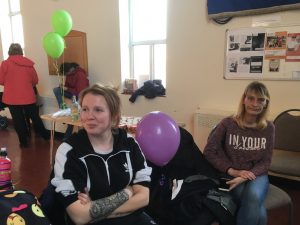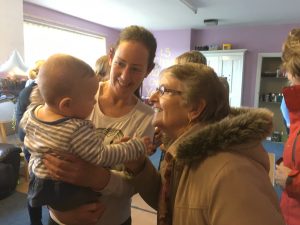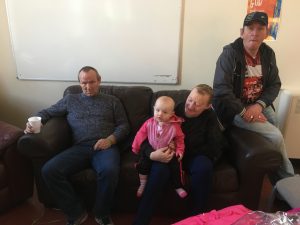Imagine if church was always the first place people in the community went to when they were struggling?
St Francis and St Barnabas in Marsh Green, Wigan is one of those places. A church God has placed in the centre of one of the most deprived areas in our Diocese that has embraced its location and the people in their community and sought to meet them and accept them where they’re at and help them rediscover hope and agency in their lives.
When Denise Hayes arrived at her new post as vicar of St Francis Kitts Green and St Barnabas Marsh Green four years ago, she was quickly confronted with the very present needs in her community leaving church one day when she saw a woman being violently beaten up. Denise knew that the majority of this visible conflict was a result of the internal struggle of addiction, but soon discovered most people in the community were not accessing the support they needed and so she decided to invite support services into the church.
Whilst the organisations using the church buildings don’t have a faith background, some have found meeting in a church benefits the impact of their services
 St Francis and St Barnabas now run a Foodbank at St Barnabas Church as well as hosting Addaction, Inspiring Healthy Lifestyles, Sure Start, solicitors, the Council, the Police who all use the building free of charge. This decision to not charge for room hire was not an easy one due to their own limited resources, but God has always provided and some of the groups using the building have contributed to its maintenance when they can. This collaboration with such a variety of services along with the time and resources given by the congregations of St Francis and St Barnabas have enabled the church to become a hub for the community, offering expertise and advice the church would never have been able to provide themselves. Whilst the organisations using the church buildings don’t have a faith background, some have found meeting in a church benefits the impact of their services. Addaction now choose to meet in the church building rather than the hall because their clients are more honest and calmer. The volunteers are also invited to the weekly prayer meetings and some of them have now begun to come along.
St Francis and St Barnabas now run a Foodbank at St Barnabas Church as well as hosting Addaction, Inspiring Healthy Lifestyles, Sure Start, solicitors, the Council, the Police who all use the building free of charge. This decision to not charge for room hire was not an easy one due to their own limited resources, but God has always provided and some of the groups using the building have contributed to its maintenance when they can. This collaboration with such a variety of services along with the time and resources given by the congregations of St Francis and St Barnabas have enabled the church to become a hub for the community, offering expertise and advice the church would never have been able to provide themselves. Whilst the organisations using the church buildings don’t have a faith background, some have found meeting in a church benefits the impact of their services. Addaction now choose to meet in the church building rather than the hall because their clients are more honest and calmer. The volunteers are also invited to the weekly prayer meetings and some of them have now begun to come along.
Having created a community where those walking through the door know they are welcomed and  accepted, the next step was to create more opportunities for people to encounter God and so Denise, Siobhan and the team began to introduce prayer and the breaking of bread at the start of Foodbank. These initial steps towards creating a space for those who came to St Barnabas during the week to connect with God led to conversations about what a new worshipping community could look like and so they explored other Christian communities in similar areas of deprivation and visited Chris Lane, who started a church on the Langworthy Estate in Salford, with the Eden Project.
accepted, the next step was to create more opportunities for people to encounter God and so Denise, Siobhan and the team began to introduce prayer and the breaking of bread at the start of Foodbank. These initial steps towards creating a space for those who came to St Barnabas during the week to connect with God led to conversations about what a new worshipping community could look like and so they explored other Christian communities in similar areas of deprivation and visited Chris Lane, who started a church on the Langworthy Estate in Salford, with the Eden Project.
people expect to be judged when they come to church, but when they realise they’re accepted it transforms their understanding of what church and Christianity is about.
 Inspired by how their vision of radical hospitality had transformed their community and become the foundation upon which they planted a church Denise, and a small team including two LML’s Ann Fairhurst and Wendy Jones began an afternoon service called Fransabas Clemt for the families who used the Food Bank and the other support services in the week. The team knew this new service would have to look radically different from their other congregations; they sit round tables rather than in rows, the Bible input is short and delivered in a creative way and then they have a song followed by food donated by Fur Clemt. The informal approach to Fransabas Clemt demonstrates there is no expectation placed on how people should behave and there is the freedom for people to talk or go out for a cigarette throughout the gathering. One afternoon a lady walked through the door declaring she wasn’t staying, but by the end of the service she was still there, she stayed for food and then returned the same week. Denise describes how ‘people expect to be judged when they come to church, but when they realise they’re accepted it transforms their understanding of what church and Christianity is about.’
Inspired by how their vision of radical hospitality had transformed their community and become the foundation upon which they planted a church Denise, and a small team including two LML’s Ann Fairhurst and Wendy Jones began an afternoon service called Fransabas Clemt for the families who used the Food Bank and the other support services in the week. The team knew this new service would have to look radically different from their other congregations; they sit round tables rather than in rows, the Bible input is short and delivered in a creative way and then they have a song followed by food donated by Fur Clemt. The informal approach to Fransabas Clemt demonstrates there is no expectation placed on how people should behave and there is the freedom for people to talk or go out for a cigarette throughout the gathering. One afternoon a lady walked through the door declaring she wasn’t staying, but by the end of the service she was still there, she stayed for food and then returned the same week. Denise describes how ‘people expect to be judged when they come to church, but when they realise they’re accepted it transforms their understanding of what church and Christianity is about.’
In communities like Marsh Green it can be so easy to limit the church’s impact to handing out supplies  creating an unequal relationship between those in the church and those in need, but Denise talks of how the church can learn from communities like Marsh Green because they’re so honest and generous with what they have, rather than believing we have all the answers. The ministry of St Barnabas and St Francis involves working with people to empower them and help the rebuild their lives physically and spiritually by showing them they are loved and accepted and helping them rediscover a sense of agency in their own lives and just recently they have changed the Food Bank to a Food Outlet working with Fur Clemt where Ann Fairhurst developed the idea of people paying £5 per year and £2 every visit and are able to choose what food they want rather than feel like they’re relying on handouts.
creating an unequal relationship between those in the church and those in need, but Denise talks of how the church can learn from communities like Marsh Green because they’re so honest and generous with what they have, rather than believing we have all the answers. The ministry of St Barnabas and St Francis involves working with people to empower them and help the rebuild their lives physically and spiritually by showing them they are loved and accepted and helping them rediscover a sense of agency in their own lives and just recently they have changed the Food Bank to a Food Outlet working with Fur Clemt where Ann Fairhurst developed the idea of people paying £5 per year and £2 every visit and are able to choose what food they want rather than feel like they’re relying on handouts.
In Marsh Green now, when someone is in need, they choose to come to church first, for a cuppa and a chat and they know they will be listened to, accepted and loved
At the beginning of the church’s ministry within this community many found it hard to see how the church would grow because so much energy was spent on serving practical needs, but many of the people visiting St Barnabas during the week are very vulnerable and the church needed to first show it was a safe, loving and accepting place that would not hurt them. The building was also right in the middle of a community with very visible needs and the church needed to respond to this. In Marsh Green now, when someone is in need, they choose to come to church first, for a cuppa and a chat and they know they will be listened to, accepted and loved; it is this Christ-inspired radical hospitality that has led to deep relationships of trust and further opportunities to share the good news about Jesus. St Barnabas and St Francis are not large churches; they have limited resources and a huge missional challenge right on their doorstep but as Denise says ‘it is not us doing anything, it is God who does the work.’ And God is most definitely at work here.
